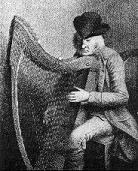|

Danny Boy
An Essay by
James Flannery, Ph.D.

James Flannery, a Yeats scholar and stage director, holds the Winship
Professorship of Arts and Humanities at Emory University. He is head of the
W.B. Yeats Foundation and founder of the Yeats International Theatre Festival
at the Abbey Theatre in Dublin. An accomplished Irish tenor, stage director and
producer, he is also an author and scholar of Irish and Celtic music, poetry,
and mythology. He was a guest speaker at Mythic Journeys '04, and returns this
year to Mythic Journeys '06.
"Danny Boy" (click to listen to
Dr. Flannery sing "Danny Boy"
Lyric by Fred Weatherly (1848-1929)
Oh, Danny Boy, the pipes, the pipes are calling
From glen to glen, and down the mountain side.
The summer's gone and all the roses falling,
It's you, it's you must go and I must bide.
But come ye back when summer's in the meadow,
Or when the valley's hushed and white with snow,
Tis I'll be here in sunshine or in shadow,
Oh, Danny Boy, oh, Danny Boy, I love you so!
But when ye come, and all the flowers are dying,
If I am dead, as dead I well may be,
Ye'll come and find the grave where I am lying,
And kneel and say an Ave there for me.
And I shall hear, though soft you tread above me,
And all my grave will warmer sweeter be,
For you will bend and whisper that you love me,
And I shall sleep in peace until you come again.
"Danny Boy" may well be the most popular song ever written. In classical, jazz,
reggae, country and western, rock 'n roll and even hip hop arrangements, it has
been performed on concert stages, in boxing rings, barrooms, nightclubs,
churches, funeral homes and many a drawing room by performers as diverse as
Mahalia Jackson, Harry Belafonte, Nana Mouskouri, Marianne Faithful, Sinead
O'Connor, Tom Jones, Elvis Presley, Isaac Stern and the great Irish tenor, John
McCormack. Interestingly, McCormack didn't perform the familiar version of the
air, but a rather banal lyric titled "Oh Mary Dear" that he had written
himself.
 The subtitle for "Danny Boy" is "The Londonderry Air," but that is something of
a misnomer because the tune has been traced to a seventeenth century harp air,
"Maidin i mBéara" ("One Morning in Beara"), composed (in a fairy trance, it is
said) by the Ulster harper, Ruari Dall O'Catháin. It was first collected,
however, off an itinerant blind fiddler from County Derry in 1851 and
published, but without a title or words, in the 1855 Petrie Collection of the
Ancient Music of Ireland. The Irish poet A.P. Graves (represented in this
volume by the lyrics for "Before the First Ray", "The Little Red Lark," and "My
Love's An Arbutus") produced two other settings of the air, but it remained for
an Englishman, Fred Weatherly (1848-1929) to give us the version that has
become world famous.
The subtitle for "Danny Boy" is "The Londonderry Air," but that is something of
a misnomer because the tune has been traced to a seventeenth century harp air,
"Maidin i mBéara" ("One Morning in Beara"), composed (in a fairy trance, it is
said) by the Ulster harper, Ruari Dall O'Catháin. It was first collected,
however, off an itinerant blind fiddler from County Derry in 1851 and
published, but without a title or words, in the 1855 Petrie Collection of the
Ancient Music of Ireland. The Irish poet A.P. Graves (represented in this
volume by the lyrics for "Before the First Ray", "The Little Red Lark," and "My
Love's An Arbutus") produced two other settings of the air, but it remained for
an Englishman, Fred Weatherly (1848-1929) to give us the version that has
become world famous.
 Weatherly, a lawyer by training,
was virtually a one-man song factory, with over 1500 published lyrics to his
credit as well as the standard English translations of the operas Pagliacci
and Cavalleria Rusticana
. In 1910, Weatherly was sent a copy of the air by his sister-in-law from the
United States. The theme he chose was inspired by personal grief - his father
and son had recently died. But to the conventional scene of parting and death
all too common in English drawing room songs, he added a number of exotic Irish
touches, including a graveside prayer. Yet none of this explains the
extraordinary success of "Danny Boy." That is primarily due to Weatherly's
skill in wedding simple, idiomatic language to the structure of the melody,
especially as a great surge of feeling slowly mounts phrase after phrase until
a climax is reached in the last line of the song. The result is a masterpiece
of popular song made up, in the words of Yeats, of "an elaboration of the
rhythms of common speech and their association with profound feeling." Weatherly, a lawyer by training,
was virtually a one-man song factory, with over 1500 published lyrics to his
credit as well as the standard English translations of the operas Pagliacci
and Cavalleria Rusticana
. In 1910, Weatherly was sent a copy of the air by his sister-in-law from the
United States. The theme he chose was inspired by personal grief - his father
and son had recently died. But to the conventional scene of parting and death
all too common in English drawing room songs, he added a number of exotic Irish
touches, including a graveside prayer. Yet none of this explains the
extraordinary success of "Danny Boy." That is primarily due to Weatherly's
skill in wedding simple, idiomatic language to the structure of the melody,
especially as a great surge of feeling slowly mounts phrase after phrase until
a climax is reached in the last line of the song. The result is a masterpiece
of popular song made up, in the words of Yeats, of "an elaboration of the
rhythms of common speech and their association with profound feeling."
While many traditional Irish airs begin with a four note motif ascending up the
scale from the fifth to the tonic (sol-la-ti-doh), as in "The Snowy Breasted
Pearl," "She Moves Through the Fair," "The Coulin," and "My Lagan Love," (the
latter typical of Irish modal scales with its flatted seventh), "Danny Boy" is
remarkable in that the melody begins on the seventh, or leading tone, and then
progresses up to the third (ti-doh-re-me). Thus, from the very first phrase, an
exquisite musical tension is created that is not resolved until the return to
the tonic in the last note of each of the two verses. Weatherly exploits this
tension in the opening phrase, "Oh Danny Boy," giving the singer the
possibility of bending the word "oh" as it leans into "Danny" and on into the
rest of the line. He skillfully echoes the same simple metric pattern in other
phrases of the song: "From glen to glen" and "tis you, tis you." The cumulative
effect of these melodic, metrical and verbal repetitions is to create an
archetypal sense of timelessness, suggesting that the same formative
experiences in life recur over and over again, with only death bringing final
repose.
Ironically, the imagery of "Danny Boy" is much less "Irish" than most of the
other lyrics in this volume. There is the boy's name, of course, the evocation
of the pipes and the rolling glens - but all within the first two lines. When
combined with the distinctively Irish flavor of the melody, however, these
images are just enough to create the right mood. Any more and the subject would
be mawkish.
And what is the subject? That, too, is archetypal. We experience in Verse One
the parting of loved ones; by Verse Two that parting carries with it the
probability of death for the person left behind. Weatherly introduces these
ideas through a set of antithetical images - "you must go and I must bide," "in
sunshine or in shadow" - only to move on from the idea of life's impermanence
to a meditation on the values that will endure beyond the grave.
Weatherly may have derived the cyclical repetitiveness of the lyric from the
Irish air, which, typically, is the very same in both verses. Each verse also
ends with a phrase that, rising out of the deliberate restraint of the rest of
the melody, soars to the highest pitch in the whole song before finally
returning to the tonic. But Weatherly provides a quite different dramatic
feeling for each of these two climactic moments. In the first verse, the singer
avows that he/she will always be "here" in the beloved place, no matter how far
from home the person departing may wander. The second verse, however, reaches a
vocal climax on the word "bend." This time the effect is more like a caress,
for we are led to imagine that the singer has died and that the hearer (upon
returning home) has approached a grave to kneel and utter a prayer. The choice
of the word "bend" for the high note is astonishing: we do not associate the
act of bending with the airy sound of angels. That is, not unless we are really
talking about the communion of souls.
 The graveside prayer is the "Ave Maria"(the Catholic "Hail Mary"), but its
Latinate reference is, again, universal. Following the brief allusion to
prayer, however, the ending of the song brings us not just to a religious but a
personal communion of the living and the dead. The melody tumbles downward
after the high, suspended note, allowing the singer to complete the tender
thought, "and whisper that you love me." Then, in the very last line of the
song, we, too - all visitors to our own imaginary gravesides - are enfolded in
a recurring pattern of mystical redemption: "And I shall sleep in peace until
you come again."
The graveside prayer is the "Ave Maria"(the Catholic "Hail Mary"), but its
Latinate reference is, again, universal. Following the brief allusion to
prayer, however, the ending of the song brings us not just to a religious but a
personal communion of the living and the dead. The melody tumbles downward
after the high, suspended note, allowing the singer to complete the tender
thought, "and whisper that you love me." Then, in the very last line of the
song, we, too - all visitors to our own imaginary gravesides - are enfolded in
a recurring pattern of mystical redemption: "And I shall sleep in peace until
you come again."
A pastiche of clichés? Perhaps, to a skeptical eye. Or a stunning musical and
poetic expression of an incredibly moving theme. For many years, sharing the
former view, I refused to sing or even learn "Danny Boy." In part, I now
realize, I was resisting the feelings it summoned in relation to my mother, who
died on Valentine's Day, 1995. On the St. Patrick's Day following her death, I
finally sang "Danny Boy," silently dedicating it to her memory.
Two years ago this autumn I had another powerful experience of the song when a
close friend of mine, Mel Konner, asked me to sing it at the funeral of his
wife, Marjorie. Mel, a distinguished university professor, happens to be
Jewish, and so, when he made the request, I was taken aback. He then explained
that it was Marjorie's and his favorite song. "OK, Mel," I said. "But you'll
have to ask the rabbi to explain that to the people who attend the service."
Mel's only request was that I change the line, "And pray an Ave there for me"
to "And lay a flower there for me."
The funeral home was filled and, as I sat among the mourners, I was filled with
angst. The notion of an Irish tenor singing "Danny Boy" at a Jewish funeral
struck me as requiring more chutzpah
than I felt I could muster. But, as I began to dwell upon the meaning of the
words, it suddenly made sense. In this context, it was Marjorie speaking one
last time to Mel. And that is exactly how it struck everyone who attended the
service.
Some scholars have compared the ornamental style of traditional sean nos singing
to cantorial music. Both traditions carry, besides an ancient lineage, a common
sense of suffering that is only overcome by summoning through music and verse
all the elements of the universe to bear witness to the frailty of existence.
"Danny Boy" was thus particularly appropriate in the context of a Jewish
memorial service meant to remind us of the universal sacredness of life.
Return to Passages
Menu
Subscribe to the Passages
e-zine
|

